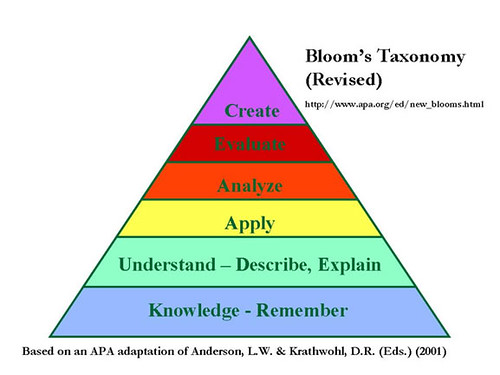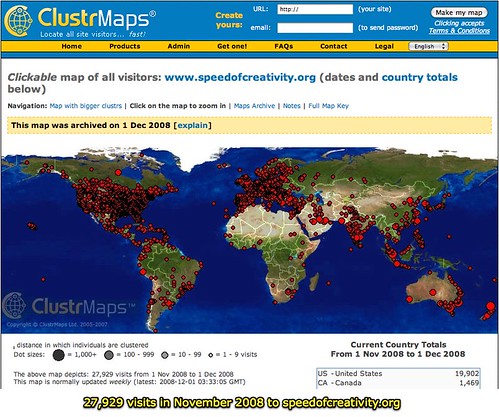Many thanks to friends and readers who sent tweets, emails, and left voicemail messages today letting me know my blog was offline!
I didn’t actually see/hear any of these messages today until this evening, and it wasn’t until about an hour ago that I was able to get on a chat line with my webhost and get things straightened out. Apparently there was a billing error, and once that was resolved my blog was again accessible to the world. Power has been restored! (Sadly, at a price of $100 per month instead of $90 per year.)

![]() photo credit: gordon2208
photo credit: gordon2208
I don’t think my wife understands the psychological and professional importance of my blog to me, at this point. It certainly is weird and strange– this nebulous, virtual “thing” out in cyberspace which provides a communications platform for me to both share ideas and interact with a wide world of educators and other readers. I’ve been thinking about this “blog psychology” a bit in the past few weeks, even before today’s incident, and I will readily admit I struggle to define and fully understand it.
Over time, since I started blogging back in 2003, writing, sharing, processing, and interacting with others via my blog and the blogs of others has become an integral part of my daily life. I’ve had people ask me with a tone of incredulity in the past six months, “You mean you post something to your blog EVERY day?” “Yes,” I responded, “I do, almost always.” That question has not been followed up with “Why?” but that is certainly a logical sequitur.
I’ve written about “why I blog” previously, although I am not readily finding a post focused exclusively on that subject to link tonight, and I’m not sure this post will fully do that question justice. Disclaimers aside, here are a few ideas why my blog (and the fact that it was down about 20 hours today) was/is such a big deal to me.
1. I love to learn, and one of the best ways I learn is by reading and writing.
As I process events and ideas in my life, I find they become better connected to other experiences and thoughts as I go through the mental steps of articulating, explaining, and often hyperlinking them to the thoughts of others. The feedback and ideas I intersect with as a result of this sharing process is also VERY powerful and transformative. This is the biggest tangible benefit to remix culture, in my view: The opportunity to appropriate and own ideas to a much greater degree of depth and breadth because of the CREATIVE writing process shared within an interactive, global environment. This ties directly to Anderson and Krathwohl’s 2001 revision of Bloom’s Taxonomy, I think. It is a much less taxing (and therefore valuable, from a learning standpoint) proposition to passively consume ideas without actively CREATING a new synthesis and evaluation of those ideas in the form of a blog post or other knowledge product. This is easy to prove with almost ANY group of students. Most would MUCH rather assume the easy, passive student role for which they’ve likely been conditioned by School their entire lives, rather than take on an active, authentically learning role. One of our important responsibilities and obligations as true teachers is to help students choose the latter path in learning, rather than the former.
2. I aspire to be a digitally relevant change agent in education in local as well as global contexts.
This is an audacious goal, and one I’ll readily admit I would never have dreamed was realistic (especially in the short term) only a few years ago. Blogging has changed a great deal for me personally, in terms of the ways I learn, the people I learn with regularly, and my opportunities to share with others. ClustrMaps makes this reality very visual.
In order to be digitally relevant in our attention economy, a lot of things must fall into place. I won’t pretend to understand all of these, but I do know a few. One is, you need to have good ideas to share. This does not necessarily mean having all the good ideas yourself, it can also mean serving as an aggregator and sharer of good ideas (and especially hyperlinks) of others. The second thing is that you need to be a consistent voice. How is authority and trust built and maintained over time in the blogsophere? I think one way, and perhaps the most important way, is via a consistent voice. This doesn’t mean that you say the same thing over and over again (the echo chamber accusation can certainly be valid at times) but it does mean you share ideas from a consistent philosophical and pedagogic perspective, and also that you share frequently.
It’s kind of weird, no one ever told me and I never read an article stating, “Post every day on your blog.” Yet somehow, over time, that has become a kind of operational ethic for me. My day is not complete without at least one blog post. Does this mean blogging is an addiction for me? Well, define addiction. The definitions in Wiktionary seem to all have negative connotations: “damages, jeopardizes or shortens one’s life,” and “life damaging consequences.” Can blogging be a negative experience or bring about negative outcomes in face-to-face life? Certainly too much time on any screen (digital or analog) can have negative consequences for our health, development, and relationships. I’m sure the folks at Common Sense Media and TurnOffYourTV.com would agree with that assessment. (I think the advice for parents on Common Sense Media is spot on, btw.) In all things, we need limits and boundaries, whether those limits are imposed internally or externally. Too much blogging CAN be a bad thing for sure. Striking a balance is often challenging.
My opportunities to blog have changed radically in the past few months, and this is not something I’ve felt comfortable blogging about… So on this subject, I’ll just say that I am REALLY looking forward to the next two weeks of holiday vacation time. Certainly there are LOTS of things to do and enjoy BESIDES blogging, and I shall… but I’m sure they’ll be a fair number of posts and podcasts forthcoming in the next 14 days… especially since my blog site is back online. 🙂
Technorati Tags:
blog, blogging, psychology, learning
If you enjoyed this post and found it useful, subscribe to Wes’ free newsletter. Check out Wes’ video tutorial library, “Playing with Media.” Information about more ways to learn with Dr. Wesley Fryer are available on wesfryer.com/after.
On this day..
- Give the Gift of Digital Security to Your Family – 2016
- Register for EdCampOKC 2016 Coming March 5th – 2015
- Exemplary MinecraftEDU Water Challenge Build – 2014
- Google Calendar Appointment Slot Double Booking Mystery – 2012
- Our Inadequate Internet Infrastructure – 2010
- WordPress 2.9 adds image editing and video embedding via oEmbed – 2009
- Ustreaming with multiple local mics and remote callers via Skype – 2009
- Discussing eBooks, the Kindle, and the iPhone Amazon Application via Ustream – 2009
- Considering options for a COV digital backpack camera upgrade – 2008
- Novelty and curiosity essential for engagement and learning – 2007




Comments
4 responses to “Restored blog access and reflections on the psychology of daily blogging”
I can certainly understand your wife questioning a $1200 annual budget for blogging. I still think that’s absurd. There are many bloggers who use blogger with very high traffic, which costs them $0. I agree, I like having my own domain and host but other than the hassle of moving, I sure hope you can find an alternative. Given your trouble of recent months, there has to be a better company out there.
I agree from the cost perspective to be sure. As much as I don’t want to go through the trouble, I think I am going to switch web hosts. BlueHost is who I’m leaning toward now, but I certainly want to check out this “fine print” issue over CPU cycles that has led me to my current situation with Siteground.
I’ve switched to bluehost and have been pleased but I haven’t checked the fine print so I can’t confirm. If you even go to the homepage and chat with an agent, they can likely answer your question.
Well I can empathize with losing your blog for a few days…and with the need to blog every day. I’m back too after a brief hiatus….that I won’t talk about in detail at the moment. Am I missing something…I am new to blogging but with Blogger and Google I seem to have my own domain – $10 per year!!! The only slowdown it seems to me is the Google Ads – which are a subscriber option.